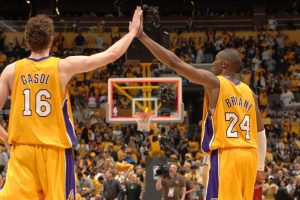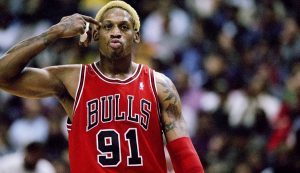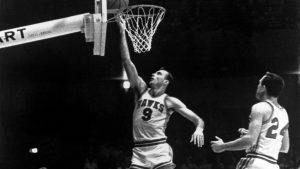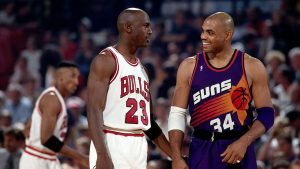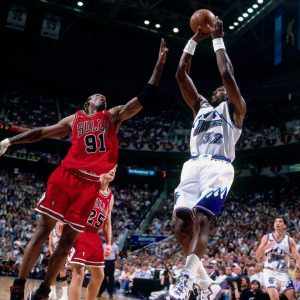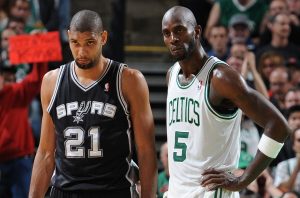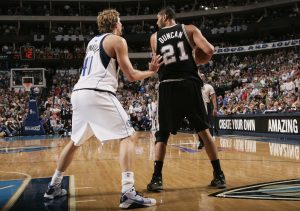Who is the greatest Power Forward of all-time?
Unlike the previous positions we have done so far, there is not a cut and dry answer here. While most people say it is Tim Duncan for his two decades of dominance and team success, I have heard arguments for a few others. Those other opinions are wrong, but you get my point. There are some varied opinions when it comes to this position.
This is also the first list where no active players will be making an appearance.
10: Chris Webber
Chris Webber was a playmaking 4 before playmaking 4s were prominent. Webber was phenomenal with the ball in his hands, able to create for himself and others. Webber’s unselfish play style would be more appreciation in today’s game, as he was criticized back in his era for not putting his head down and scoring.
In the early 2000’s, power forwards were expected to rebound and score inside. Webber excelled in those areas, but too often was criticized for wanting to “revolutionize” the position. But in reality, Webber was just ahead of his time. He was a complete player, scoring, playmaking, defending and rebounding, he did it all.
He was the face of the early 2000’s Sacramento Kings. The team was explosive, fun to watch, and had the pieces to win a championship. Unfortunately they peaked in the Shaq-Kobe era so they were bounced out before making a Finals appearance.
Career Averages: 20.7 points, 9.8 rebounds, 4.2 assists, 1.4 steals, 1.4 blocks
Best Season: 27.1 points, 11.1 rebounds, 4.2 assists, 1.3 steals, 1.7 blocks
Accolades:
MVP: 0
Championships: 0
Rookie of the Year
All Star Selections: 5x
All NBA Teams: 6x
9: Pau Gasol
Pau Gasol might be the most under appreciated power forward in his generation. Playing in the era of Duncan-Garnett-Nowitzki, Gasol fly’s way under the radar when topic go best power forwards comes up.
But when you take a second and look at Gasol’s production, importance to globalizing the sport, and the fact that he won 2 titles, you begin to realize he’s deserving to be on the list.
The skilled 7-foot Spaniard was a hard matchup for opposing teams. If you went small to compensate for Gasol’s quick feet, he’d shoot right over you and bully you in the post and on the glass. If you went big, Gasol would pick and pop you to death from the elbow. He was a nightmare for opposing teams.
His role in the Lakers 3 straight finals appearances and back to back tiles can’t be expressed enough. One could argue without Gasol making the way to Los Angels, Kobe Bryant doesn’t finish his career a Laker. Kobe Bryant doesn’t win a ring, let alone two without Shaquille O’Neal.
Career Averages: 17.0 points, 9.2 rebounds, 3.2 assists, 1.6 blocks
Best Season: 18.3 points, 11.3 rebounds, 3.4 assists, 1.7 blocks
Accolades:
MVP: 0
Championships: 2x
Rookie of the Year
All Star Selections: 6x
All NBA Teams: 5x
8: Dennis Rodman
Dennis Rodman, one of the wildest and most enigmatic players the sports world has ever seen, checks in at the 8th spot. In a game and position ruled by giants, Rodman carved out a unique role for himself, one yet to be duplicated.
While he was never a scoring threat, Rodman made up for it with extraordinary defense and rebounding. For a 10-year stretch from 1990-91 to 1999-2000, Rodman’s 15.9 rebounds per game where by far the most. Second place Shaquille O’Neal was 3.5 rebounds per game behind. That distance is about the same as the gap between Shaq and 23rd-place Vin Baker over that time frame.
But before he became the leagues most notorious rebounder, Rodman was busy winning back-to-back Defensive Player of the Year awards in 1990 and 1991. After winning the award, Rodman while fighting back tears said “I wanted this award so bad.” It was clear that once Rodman focused in on something, he was going to give it his all until he secured it.
That mentality helped him be apart of five championship teams.
Career Averages: 7.3 points, 13.1 rebounds, 1.8 assists, 0.7 steals, 0.6 blocks
Best Season: 9.8 points, 18.7 rebounds, 2.3 assists, 0.8 steals, 0.9 blocks
Accolades:
MVP: 0
Championships: 5x
DPOY: 2x
Rebounding Champion: 7x
7: Bob Pettit
Bob Pettit isn’t a name todays generation is family with, and I can’t blame you since he played in the 1950’s. But he sure did dominate his era.
Pettit is viewed as the leagues first premier big man. Over his 11-year career, no one scored more points (20,880) than Bob Pettit. Bill Russell (15,206) was the only player who had more boards than him (12,849). Pettit is also the first to win league MVP.
Career Averages: 26.4 points, 16.2 rebounds, 3.0 assists
Best Season: 31.1 points, 11.6 rebounds, 3.1 assists
Accolades:
MVP: 2x MVP
Championships: 1x
All Star Selections: 11x
All NBA Teams: 11x
6: Kevin McHale
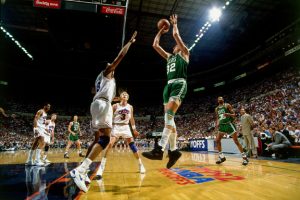
Not many people can say they are top 10 at their position, yet didn’t start for the first 5 seasons of their career. But Kevin McHale is one of them.
After being selected with the third overall pick in the 1980 NBA draft, McHale started just over 20 percent of the games he played in his first five seasons. But he said he didn’t mind.
“On this team, there is so much talent,” McHale said of the Boston Celtics. “It’s never bothered me.”- McHale told the New York Times
McHale averaged 15.2 points, 6.9 rebounds and 1.9 blocks in just 28.4 minutes off the bench for the first 5 seasons. But his role would be expanded into the starting lineup, and his production would increase with it. Over the next 5 seasons, he averaged 22.7 points, 8.6 rebounds, 2.4 assists and 1.8 blocks in 36 minutes of action.
McHale, the man of 1,000 moves, made a career out of using his nimble footwork and pump fakes while dominating the post. While his playing time doesn’t match up with the rest of the guys on the list, McHale still managed to leave an imprint on both ends of the floor.
His role on the Celtics dynasty of the 80’s can’t go unnoticed. He helped contribute to the 3 titles in the decade, and is forever immortalized into Celtics history.
Career Averages: 17.9 points, 7.3 rebounds, 1.7 assists, 1.7 blocks
Best Season: 26.1 points, 9.9 rebounds, 2.6 assists, 2.2 blocks
Accolades:
MVP: 0
Championships: 3x
6th Man of the Year: 2x
All Star Selections: 7x
All NBA Teams: 8x
5: Charles Barkey
Charles Barkley, everyone’s favorite analyst, is so much more than a guy who gives uncensored hot takes on Inside the NBA. Barkley is one of the best to ever play regardless of how you define greatness.
Barkley has made his thoughts on analytics be well known. He is one of the loudest critics of the advanced stats. But ironically enough, the advanced numbers suggest he’s one of the best players in NBA history.
LeBron James (9.1) and Michael Jordan (8.1) are the only players with higher career box plus/minuses than Barkley (7.4). He’s also 11th all time in career win shares per 48 minutes. But let’s not continue with the advanced stats because Charles doesn’t enjoy them.
The basic numbers also make a case for Barkley as one of the best ever.
From 1985-86 through 1996-97, Barkley averaged 23.9 points, 12.0 rebounds, 4.2 assists, 1.7 steals and 0.9 blocks, with a 61.9 true shooting percentage. Shaquille O’Neal (13), Kareem Abdul-Jabbar (12), Wilt Chamberlain (12) and Hakeem Olajuwon (12) are the only players who had more seasons than Barkley (11) averaging at least 20 points and 10 rebounds.
The only knock on Barkley is that he never broke through and won a championship, a reoccurring jab Shaq takes at him weekly. But like another guy on the list, Barkley got to the Finals but happened to run into Michael Jordan, and we know how that goes.
Career Averages: 22.1 points, 11.7 rebounds, 3.9 assists, 1.5 steals, 0.8 blocks
Best Season: 28.3 points, 11.9 rebounds, 3.2 assists, 1.3 steals, 1.3 blocks
Accolades:
MVP: 1x
Championshops: 0
All Star Selections: 11x
All NBA Teams: 12x
4: Karl Malone
Very few players have the combined production and longevity of Karl Malone. If you isolate Malone’s rookie and final year, you get 17 years of pure dominance. Not many people can say they had a 17 year career, let alone years of dominance.
In those 17 years, Malone averaged 26.0 points, 10.3 rebounds, 3.6 assists, 1.4 steals, and 0.8 blocks. Like durability? Malone played 80 or more games in 16 of those 17 years.
When you break down his peak to a normal 10-year peak, Malone’s numbers are even more ridiculous.
From 1988-89 through 1997-98, Malone averaged an absurd 27.6 points, 10.8 rebounds, 3.6 assists, 1.5 steals and 0.9 blocks.
By the time he hung them up, the Mailman was second all time in points scored and sixth in rebounds. The only thing Malone didn’t achieve in his illustrious career was win a championship. But we shouldn’t hold his feet too close to the fire for that. Like so many other greats of the era, Malone had the misfortune of hitting his peak while Michael Jordan had the world in the palm of his hand.
Career Average: 25.0 points, 10.1 rebounds, 3.6 assists, 1.4 steals, 0.8 blocks
Best Season: 31.0 points, 11.1 rebounds, 2.8 assists, 1.5 steals, 0.6 blocks
Accolades:
MVP: 2x
Championships: 0
All Star Selections: 14x
All NBA Teams: 19x (3 all defensive 1st teams)
2nd on the all-time scoring list
He piled up 14 All-Star selections, 14 All-NBA selections, four All-Defensive selections and two MVPs.
3: Dirk Nowitzki
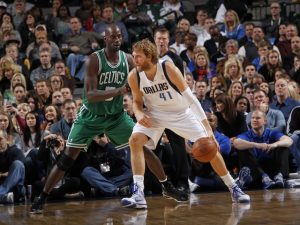
Dirk Nowitzki revolutionized the game, and that is not hyperbole. Without Nowitzki there is no saying what the league looks like today. He expanded our expectations of 7-footers, opening an era more reliant on skill than any before it. Nowitzki showed that a 7-footer could face up and shoot the 3 ball. They didn’t have to be physical and stay in the post.
Nowitzki is on the short list of players who changed the game.
Beyond what he did for the game, Nowitzki did his fair share of dominating. The league was not ready for a 7-footer with such accuracy from beyond the arc, and Nowitzki took full advantage.
When you isolate his 12 year peak (2000-11), Nowitzki averaged 24.1 points, 8.7 rebounds, 1 block, shooting 48% form the field and 38% from 3 point range.
This 12-year peak includes an MVP campaign, but Nowitzki will tell you his best season came years later.
Nowitzki’s career defining moment came in the 2011 playoffs. He went on one of the most improbable title-winning runs, sweeping Kobe’s Lakers, beating the OKC Thunder “baby big 3”, and eventually pulling off one of the greatest upsets in league history. Nowitzki’s Mavs took down the Miami Heat’s Big 3 of LeBron James, Dwyane Wade, and Chris Bosh in the NBA Finals. This marked the last non-superteam to have win the NBA championship.
It was that title run that cemented Nowitzki’s legacy.
Career Averages: 20.7 points, 7.5 rebounds, 2.4 assists, 1.3 threes, 0.8 steals, 0.8 blocks
Best Season: 26.6 points, 9.0 rebounds, 2.7 assists, 1.4 threes, 0.7 steals, 1.0 blocks
Accolades:
MVP: 1x league, 1x Finals MVP
Championships: 1x
All Star Selections: 14x
All NBA Teams: 12x
6th on the all time scoring list
2: Kevin Garnett
Before the days of Giannis Antetokounmpo and Lebron James redefining what a front court player could and should do, Kevin Garnett was laying the foundation. Garnett is the most well rounded power forward of all time, there was nothing he didn’t do well.
He could dominate the boards. From 1999-2008, Garnett led the NBA with 12.4 rebounds per game.
Garnett is one of the best front court defenders the game has seen. Garnett is first all time in career defensive rebounds, 18th in career blocks and 18th in career steals. He won one Defensive Player of the Year and made 12 All-Defense teams.
Also don’t sleep on the playmaking ability of Garnett, as averaged 6 assists per game in the 2002-03 season.
Last but not least, KG could score with the best of them. He’s 17th on the all time scoring list, and he averaged at least 20 in nine straight seasons from 1998-99 to 2006-07.
But maybe the aspect of the game Garnett thrived most in is leadership. There is no quantitive value or measurement, but ask anyone who’s been on the floor with him and they’ll tell you the type of leader he was.
His leadership was front and center for the world to see during the Boston Celtics’ Big 3 era. After the 2008 NBA Finals Game 7 victory, KG gave us one fo the best post game quotes with “Anything is possible!”
Career Averages: 17.8 points, 10.0 rebounds, 3.7 assists, 1.3 steals, 1.4 blocks
Best Season: 24.2 points, 13.9 rebounds, 5.0 assists, 1.5 steals, 2.2 blocks
Accolades:
MVP: 1x
Championships: 1x
All Star Selections: 15x
All NBA Teams: 22x (Includes all defensive selections)
DPOY
1: Tim Duncan
I could repeat myself, but I’d rather not waste my time so for Duncan’s case for greatest power forward, go read my player spotlight on him.

